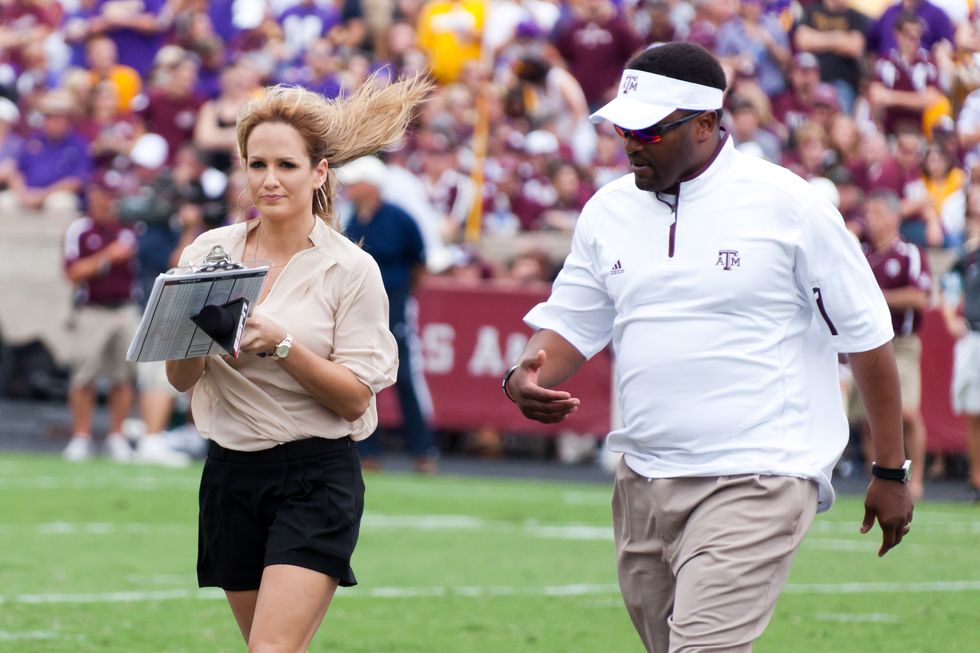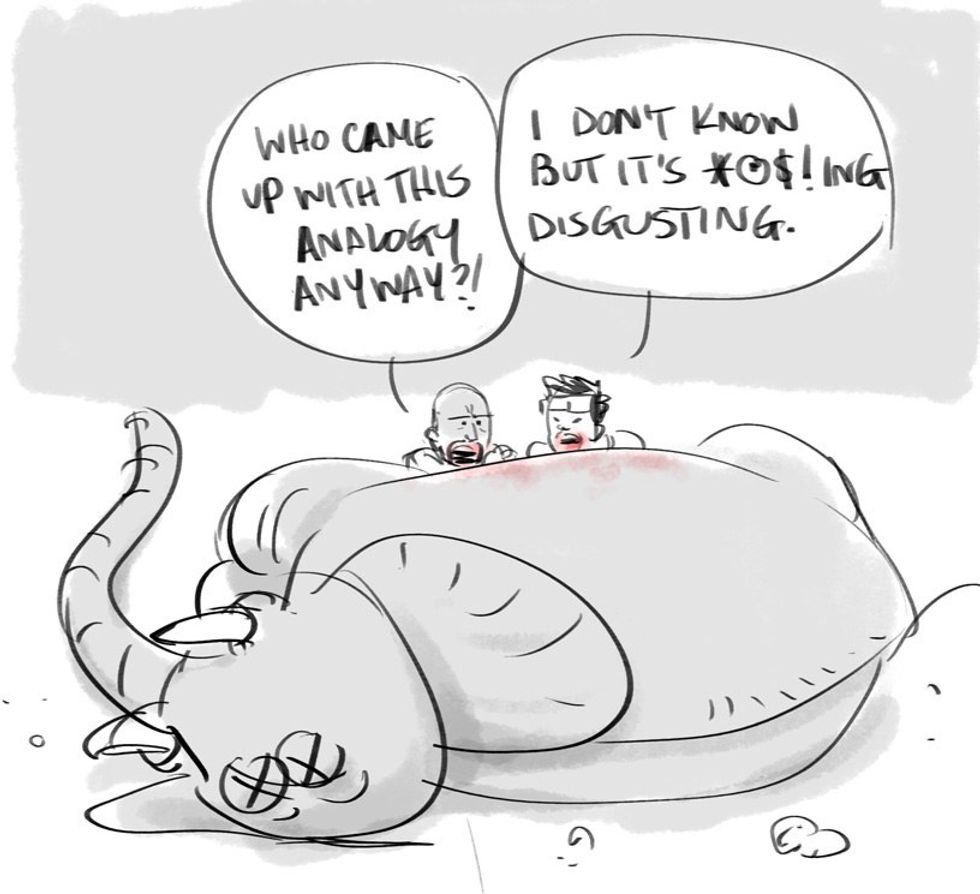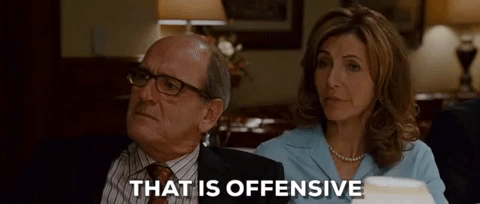The number of times that people have told me that my decision to study journalism is not a smart one greatly outnumbers the amount of people who support it. Not only do they criticize the field in general, but also the specific route I'm wanting to go down; sports journalism.
The amount of questioning I receive from my family, friends, and professors is absurd. I get asked if I'm aware of the financial reality, the "decrease" in demand for news, and what makes me think that I, as a woman, can make it in the sports industry. Well folks, hear me out for a second.
1. "Why do you want to get into that? It's really boring."
Why journalism? Because there are too many people in this world that think the news is "boring". The more uneducated we are about what's really going on in our nation and world, the more we will suffer as a whole. We will continue to make fools of ourselves by thinking our reality is something completely different than what it really is. I want to be able to help communicate and educate a population of any size if it means getting the most correct and accurate information into the minds of Americans across the country. Having the opportunity to be an educator to millions all at once is anything but boring, in my opinion.
I want to be a force of change in this world, and this is how I want to do it. I want to help change the stigma in the sports industry by bringing more attention to female athletes and their successes.
In a class I took last semester about gender roles in the media, my professor, Eric Lohman, raised a point. He pointed out that in a SportsCenter newscast, only 2.9% of the time is it dedicated to female athletes and their sporting events. That means that in a 60 minute episode, only one 50-second interview with a female athlete was shown following the briefest of highlight reels. I know for a fact that women make up more than 2.9% of the sports industry amongst all the teams in all the leagues for all the sports that our nation has to offer. They should get more than 50 seconds of recognition.
2. "People don't read the news anymore."
That's where you're very wrong. While yes, people don't read newspapers as much as they used to, the use of online journalism is at an all time high. According to The American Press Institute in their 2014 study, it was found that 87% of Americans get their newsworthy information via television while 69% use their computers, 65% listen on their radios, and 61% still read a newspaper or magazine. As one can assume, with the increase of technology use, the numbers pertaining to technology based resources has only increased. Along with that increase comes an increase in presence of news articles in social media. You're more likely to read a breaking news story on your Facebook timeline than in a magazine that's sold at the grocery store. There's also different forms of news communication on the television. While you have your classic newscast like Good Morning America, you also have your alternative journalism forms. A popular example of this is The Daily Show on Comedy Central. This show takes a comedic and satirical twist on your average newscast to appeal to younger generations so that they can be well informed. While some may think that this is an inaccurate way to broadcast the news, I would argue that it isn't. It's communicated in a more casual, and entertaining way so that it holds the attention span of our nation's youth and adult age groups. To put a cap on this topic, you're correct if you say that people don't read a physical copy of the daily and local news as much as they used to. Instead, people are reading articles online; a platform that gives them more of an opportunity to learn about the current events happening within their communities as well as communities across the globe.
3. "You know the pay isn't that great, right?"
Oh trust me... I'm aware. More than aware, really. I know that the average broadcast journalist has a starting salary at about $20k. What you don't realize is that I'm willing to start at the bottom, pay my dues, and make my way to the top where the big dogs make $83k a year and possibly more depending on which broadcast company they represent. I'm already living the life of a broke ass college student so I'm fully confident I can keep up this lifestyle for a few more years until I really get things rolling. Please, don't keep reminding us aspiring journalists that we won't be making as much as a neurosurgeon because that's not what we want to be compared to. We don't want to be compared to STEM majors who think what we want to do is a joke because it is most definitely not. So let me be with my $20k. So far, I'm in love with this field and if the trend continues, I will end up loving my job regardless of its pay.
4. "But you're a woman...?"
Yes. I am aware that only 11% of sports journalists are female. Yes. I am aware that the remaining 89% of male sports journalists tend to dominate that area of expertise. But it takes the right kind of female to get into that 11% and to make that number grow. I am a woman who has always had a self-driven personality, a tenacity like no other, and has only once or twice let the comments and concerns of others stop me from going after what I want. I chose to get involved in a sports related field because I genuinely have a love for sports. I love to watch, play, and follow teams and the news that goes along with it. I played lacrosse throughout all of high school and continue to play in college. Around the time I started getting really involved with that sport, I became more aware of other sports and their highlights. While I may not have every stat of every player from every year they’ve been playing memorized, I do know how to follow and recap what happens in a game. I know the terminology, the rules, the penalties, and the teams that are in favor to win going into each game I watch.
By bringing more women into this industry, I believe that equal coverage of each gender’s sporting events will eventually be achieved. By bringing more attention to women’s sports, one can hope for equal pay amongst teams as well. For example, the USA women’s soccer team makes 40% less than the men’s team even though they are significantly more successful. According to Business Insider, while the women have a base salary of $72k with a $1,350 winning bonus, the men have a base salary of $100k, along with a $5k per-game bonus, and get $3,166 per win. Keep in mind that the women have three World Cup Champion titles as well as four Olympic gold medal wins. The men? They have no titles. May I also remind you that the men’s team didn’t qualify for this year’s World Cup Championship? These non-qualifiers get paid significantly more, get more benefits, and have more fame than the women’s team who deserves the hype that the men get. So yes. You're correct. I am a woman. What does that have to do with anything?
5. "Journalism is dead."
Amongst all the comments mentioned beforehand, this is the one I hear the most. A majority of the population seems to think that journalism is currently dead. If it's dead, please tell me why you have knowledge of the Republican GOP bill. How do you know about the California driver who managed to crash his car into the second story of a building? How did you find out about Aaron Rodgers’ new girlfriend, professional race car driver, Danica Patrick? You heard about it through the news. Most teenage girls start their mornings by reading public stories on Snapchat that are produced by various news companies like Cosmopolitan, Buzzfeed, National Geographic, and even The Food Network. While this isn't your average newspaper article or formal news broadcast, this is a form of journalism. These off-the-beaten-path forms of journalism are overlooked in the eyes of the reader. Often, people don’t realize that apps like Snapchat are a wonderful form of journalism. Other apps like Instagram and Twitter also have jouranlistic features. People are constantly tweeting about Trump’s latest upsetting tweet, police brutality cases, and women’s rights movements. The more people tweet about these subjects and the more that people retweet the original post, the more people become aware of the topic. On the other hand, Instagram has curated advertisements for products you show interest in, deals going on at local businesses, and pre-sale alerts for musical artists that you follow. These advertisements also count as journalism. After looking at the evidence that is apparent in a majority of our lives, one can realize that journalism is in fact not dead. It is in fact underappreciated.



 Photo by
Photo by  Photo by
Photo by 
 Photo by
Photo by 






















